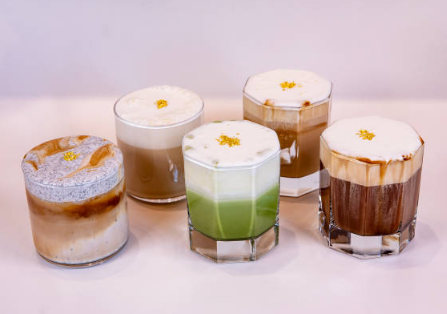Sometimes, it feels impossible to survive a 9-to-5 grind without caffeine. For many people, that morning cup of coffee (or matcha) is what gets them through the day—providing both an energy boost and a satisfying flavor. But have you ever wondered which source of caffeine is actually better for your body? Let’s take a closer look at coffee and matcha, their individual health benefits, and which one might come out on top.

The Benefits of Matcha and Coffee
Matcha
Matcha is a finely ground powder made from green tea leaves and is known for its vibrant green color and impressive health perks.
-
Low Acidity: Compared to coffee, which has similar caffeine content, matcha is much gentler on the stomach. Its low acidity makes it a better option for people with sensitive digestion.
-
May Reduce Stress: Matcha contains L-theanine, an amino acid with several health benefits. Studies suggest L-theanine has anti-stress properties and, when combined with caffeine, can promote calm alertness and sustained energy without the jitters.
-
Packed with Antioxidants: Matcha is rich in EGCG (epigallocatechin gallate), a powerful antioxidant that’s found in much higher concentrations than in other types of green tea. These antioxidants can help neutralize free radicals and may even support the body’s natural detox process.
-
Natural Energy Boost: An 8-ounce serving of matcha provides around 70 mg of caffeine—enough to give you a noticeable energy lift, especially helpful on sluggish mornings.
Coffee
There’s no denying that coffee is a beloved pick-me-up around the globe, but it also offers more than just an energy kick.
-
Supports Cognitive Health: Coffee contains polyphenols, antioxidants, and of course, caffeine—all of which support brain function. A large study published in the European Journal of Clinical Nutrition observed over 600 elderly men and found that those who drank coffee regularly experienced slower cognitive decline compared to non-coffee drinkers. Those who drank three cups a day had the least decline.
-
May Promote Longevity: According to a major study published in the Annals of Internal Medicine, higher coffee consumption was associated with a lower risk of death—particularly from digestive and circulatory diseases.
-
Stimulates Digestion: Many people find coffee helps get their digestive system moving, possibly due to its warmth or its compounds. While the exact cause isn’t fully understood, this benefit seems to be widely experienced.
-
Higher Caffeine Content: An 8-ounce cup of black coffee contains about 96 mg of caffeine—significantly more than matcha. This makes it a potent energizer but also one to monitor if you’re sensitive to caffeine.

So, Which One Is Better?
Both coffee and matcha offer impressive health benefits, but coffee’s high acidity can be an issue—especially for those with sensitive stomachs. If you still want to enjoy coffee without discomfort, consider cold brew, which is lower in acidity and smoother in flavor.
That said, too much caffeine—whether from coffee or matcha—can cause side effects like increased anxiety, dehydration, or restlessness. So, think twice before pouring that fourth cup in the afternoon.
If you’re prone to stress or anxiety, matcha’s calming qualities may be a better fit for your lifestyle. Plus, matcha is generally easier on the body and comes with fewer downsides, making it the winner in terms of overall health impact.
How to Enjoy Both
Beyond the usual drinks, both coffee and matcha are versatile ingredients and can be incorporated into your wellness routine in other ways.
Want to boost your collagen intake? Stir a scoop of collagen powder into your morning coffee or matcha latte.
Need to exfoliate dry skin? A homemade coffee scrub can slough off dead skin cells and give your complexion a fresh glow.
The Bottom Line
Both coffee and matcha can enhance energy, boost focus, and provide powerful antioxidants when consumed in moderation. But if you’re looking to enjoy those benefits while reducing caffeine-related anxiety and acidity, matcha is likely your best bet.